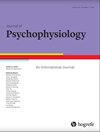Avoidant Personality Disorder Symptoms and Cardiovascular Reactivity to Psychological Stress Tasks With Increasing Cognitive Demands
IF 0.9
4区 心理学
Q4 NEUROSCIENCES
引用次数: 0
Abstract
Abstract. This study aimed to investigate whether and how avoidant personality disorder symptoms are related to cardiovascular reactivity to stress tasks with different levels of cognitive demands. The revised Chinese edition of the avoidant personality disorder subscale of Personality Diagnosed Questionnaire-4+ (PDQ-4+) was administered to 222 undergraduate students randomly assigned to psychological stress tasks (i.e., mental arithmetic tasks) with low, moderate, or high cognitive demands (manipulated by task difficulty), during which their physiological data were continuously collected. Results showed that avoidant personality disorder symptoms and cognitive demands of tasks interactively predicted systolic blood pressure (SBP) and diastolic blood pressure (DBP) reactivity. In specific, avoidant personality disorder symptoms were not associated with SBP reactivity under the low- and moderate-demand conditions and DBP reactivity under the low-demand condition but were associated with blunted SBP reactivity under the high-demand condition and blunted DBP reactivity under the moderate- and high-demand conditions. These findings indicate that the association between avoidant personality disorder symptoms and cardiovascular reactivity to psychological stress is contingent on the cognitive demands of tasks, which have potential implications for physical health.逃避型人格障碍症状和心血管对认知需求增加的心理应激任务的反应
摘要本研究旨在调查回避型人格障碍症状是否以及如何与不同认知需求水平的压力任务的心血管反应有关。采用人格诊断问卷(PDQ-4+)回避型人格障碍分量表中文版修订版,对222名大学生随机分配到低、中、高认知需求(由任务难度操纵)的心理应激任务(即心算任务)中,在此期间连续收集其生理学数据。结果表明,回避型人格障碍症状和任务认知需求交互预测收缩压(SBP)和舒张压(DBP)反应性。具体而言,回避型人格障碍症状在低需求和中等需求条件下与SBP反应性和低需求条件下的DBP反应性无关,但在高需求条件下,与SBP活性减弱和DBP活性减弱有关。这些发现表明,回避型人格障碍症状与心血管对心理压力的反应之间的联系取决于任务的认知需求,这对身体健康有潜在影响。
本文章由计算机程序翻译,如有差异,请以英文原文为准。
求助全文
约1分钟内获得全文
求助全文
来源期刊

Journal of Psychophysiology
医学-神经科学
CiteScore
2.60
自引率
7.70%
发文量
25
审稿时长
>12 weeks
期刊介绍:
The Journal of Psychophysiology is an international periodical that presents original research in all fields employing psychophysiological measures on human subjects. Contributions are published from psychology, physiology, clinical psychology, psychiatry, neurosciences, and pharmacology. Communications on new psychophysiological methods are presented as well. Space is also allocated for letters to the editor and book reviews. Occasional special issues are devoted to important current issues in psychophysiology.
 求助内容:
求助内容: 应助结果提醒方式:
应助结果提醒方式:


